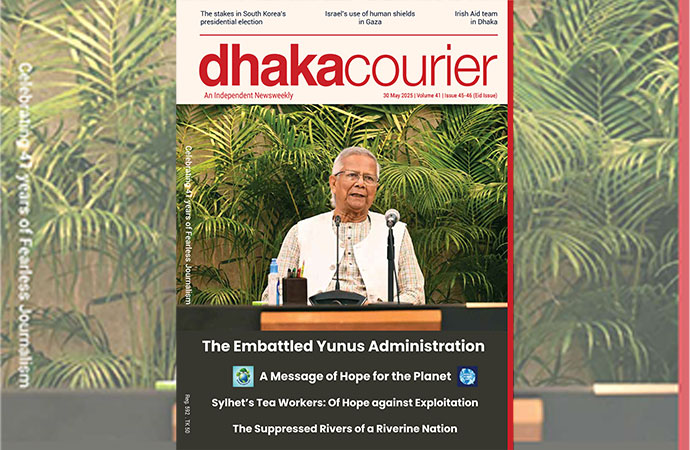Column

The UN Human Rights Office has voiced deep concern over escalating conflict between the Myanmar military and the rebel Arakan Army which has displaced several thousand Rohingyas within the country and many thousands to escape to Bangladesh.
The UN is disturbed by the intensification of conflict in recent weeks in Rakhine State and condemn what appear to be indiscriminate and attacks directed at civilians by the Myanmar military and armed fighters in the context of the ongoing fighting with the Rakhine Arakan Army, reportedly stated by Ravina Shamdasani, spokesperson for the UN High Commissioner for Human Rights, in Geneva.
In a press statement in recent days, Ms. Ravina reportedly said the conflict between Myanmar military, known as the Tatmadaw and the Arakan Army has given credible reports of killing of civilians, burning of houses, arbitrary arrests, abductions, indiscriminate fire in civilian areas and damage to cultural property.
In the most recent escalation reportedly on April 3, two military helicopters flew over Hpon Nyo Leik village tract to south Buthidaung fired on civilians tending cows and paddy fields, reportedly killing at least seven civilians and injuring 18 others. This attack was carried out in an area that has reportedly created large-scale displacement in recent days.
According to the UN, some 40,000 Rohingyas were displaced from the villages along the road connecting Buthidaung and Rathedaung towns between 25 March and 30 March. The displaced people fled westward and took shelter in areas including Npon Nyo Leik village tract. The UN reportedly called Myanmar military to immediately cease hostilities and to ensure that civilians were protected.
The international community is reportedly taking steps towards accountability for the crimes against its civilians which may constitute war crimes.
With each passing days as more and more Rohingyas are being made to leave India and Saudi Arabia for Bangladesh which is now having to accept more refugees than the country ever thought of. Saudi Arabia has sent more Rohingyas holding Bangladeshi passports, reportedly obtained illegally.
A group of Rohingyas, including 17 children and six women, were moored for five days in the no-man's land outside Brahmanbaria (Bangladesh) for attempting to enter Bangladesh. They were eventually returned put in jail custody in India.
Similarly the Saudi Arabia has recently deported 13 Rohingya refugees to Bangladesh, accusing them of holding Bangladeshi passports illegally. The Saudi government has also rounded up 150 refugees with the plan to deport them. Many of these refugees had been staying in the country for 6-7 years.
Entire world praises Bangladesh for playing host to over a million persecuted Rohingyas from Myanmar. But with its own huge population base and limited resources, Bangladesh's capacity to accommodate more has now been put into a test. With each passing days as more and more Rohingyas are being made to leave India and Saudi Arabia, Bangladesh is now having to accept more refugees than this country ever thought of hosting.
Over the last few months, around 1,300 Rohingya refugees have crossed the Bangladesh-India border into the country and taken shelter in the camps in Cox's Bazar.
The fighting has reportedly impacted on civilians of various ethnicities in Rakhine, Rohingya, Chin, Mro and Daignet.
The Foreign Minister AK Abdul Momen termed the Rohingya influx "a very serious issue" and said there is no easy solution to the humanitarian crisis. He made the remark while talking to reporters at his office in recent days.
"We will have to face difficulties," he said adding, he has directed the authorities concerned to conduct a study and find what impacts the Rohingya refugees have in our country's social, economic and security system."
Momen also mentioned that following the influx, Prime Minister Sheikh Hasina had made a five-point proposal in the UN general assembly.
"But those proposals were not reflected in our negotiations," he said, urging the international community to step forward for resolving the crisis.
Momen told reporters that he had already asked his ministry to make an impact analysis of the crisis from economic, social and security dimensions.
"If the crisis persists, then our neighbouring countries including India, Thailand, Myanmar, and China will be affected along with us," he said.
Meanwhile, the foreign minister is preparing to make his first official visit to India soon. He was reportedly invited to visit the neighbouring country by his Indian counterpart External Affairs Minister Sushma Swaraj. However, the date of his travel is still not fixed.
"India is our neighbour. The two neighbouring countries share a warm relation. They [India] invited me," Momen told reporters.
The Rohingya refugee issue has a direct impact on Bangladesh. However this not a problem for Bangladesh as this is rooted in Myanmar's policy towards its ethnic minorities. At the same time, the refugees cannot be returned to the country of origin under the international law-the 1951 Convention on the Law of Refugees unless normal conditions and political stability have been restored.
The High Commissioner for Refugees in 1994 reportedly said that "if yesterday's repatriation is not to become tomorrow's emergency, then the international community must show greater understanding to-post conflict rehabilitation. However many governments do not allow the refugees to return on the ground of "national security."
According to the UNHCR reports of 1999, the largest number of refugees (236,000) returned to Liberia, Sierra Leone (195,000), Bosnia and Herzegovina (129,000) and Afghanistan (107,000). The female returnees constitute about 56% according to reports.
The refugees suffer from dislocation of their lives and the consequences of trauma and dislocation of refugees do not disappear soon. Often, they are not welcome in a new country.
Barrister Harun ur Rashid, Former Bangladesh Ambassador to the UN, Geneva.

























Leave a Comment
Recent Posts
Enayetullah Khan to represent ...
Enayetullah Khan, Editor-in-Chief of United News of Bangladesh (UNB), ...
The tragedy in Ahmedabad touch ...
Air crashes are inherently international incidents, and the emotions t ...
Asset recovery a key focus; breakthroughs from talks ..
'It'll inspire youths to build Bangladesh they dream ..
UK envoy Sarah Cooke happy with Yunus’ visit to Brit ..
Prof Yunus honoured with prestigious Harmony Award b ..